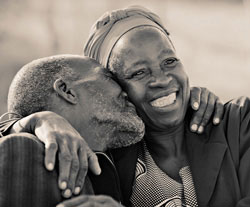5 Approaching death
One of the aims of end-of-life care is that the person has a good death. If possible, what constitutes a good death is decided by the person who is dying. You will now follow the case study about Frank and Grace. This case study has been divided into separate activities so that you can follow them as they prepare for Frank’s death. In the first part you learn more about difficult conversations.
Activity _unit4.5.1 Activity 5
Part 1
Read an excerpt that has been adapted from Finding the Words from the National End of Life Care Programme (Department of Health, 2011). It is about the worries that people and carers might have at the end of their life.
Key worries that people and carers might have at the end of life
- Relationships
Am I still needed as a partner/parent/son/daughter or friend?
- Existential/spiritual
Why me?
Why now?
What have I done to deserve this?
- Physical/symptoms
Will I be in pain or experience any other physical symptoms such as incontinence, weight loss?
Will I lose control of my bodily functions?
- Psychological
Will it change how people view me?
Will I be an outcast/avoided?
Should I tell people? How?
Will I lose control of my mind?
Do I really believe I am going to die?
- Treatment
Will it cause any unpleasant side effects?
Will it prolong my life?
Will I be able to cope?
- Practical
What financial arrangements do I need?
Who will look after the children/pets/parents/relatives?
- Social/support
Who will look after me?
What extra help is there?
- Dying
How long?
How ill will I become?
What will it be like?
Part 2
Now read the case study about Frank and Grace and answer the questions that follow.
Case study _unit4.5.1 Case study: Frank and Grace Taylor
Frank (64) and Grace Taylor (62) are very close. They have been married for over forty years. Frank is a retired civil engineer who has been receiving palliative care for bowel cancer for over a year. He is now receiving end-of-life care. He has secondary tumours throughout his body. There is little record of his health conditions prior to his diagnosis as he rarely visited his GP. He liked meat-based meals and drank spirits moderately at the weekend. Grace has been treated for depression recently.
Over the last month Frank has gradually grown weaker. Grace is adamant that she wants to be fully involved in his care. There has been much in-depth discussion of his approaching death. The time for a ‘difficult conversation’ has come to find out from Frank and Grace what is important to them towards the end of life.
For Frank an advanced care plan aimed to keep him at home in line with his and Grace’s wishes. He was helped with personal care by carers from a local agency, and a community/home nurse visited daily to tend to the more technical elements of his care including medicines management.
- What sorts of thing would you want to discuss with someone facing the end of their life?
- How would you approach Frank and Grace about these matters?
Discussion
There are some questions that are appropriate for the person whose life is ending and other questions that should be asked of their family or friends. Asking questions of other people might provide you with information that would enable you to give good-quality person-centred care; that is, care that the person near death deems to be good quality. Sometimes it might be difficult for people or their relatives to tell you what matters to them. Being sensitive, genuine and compassionate are vital at such times.

